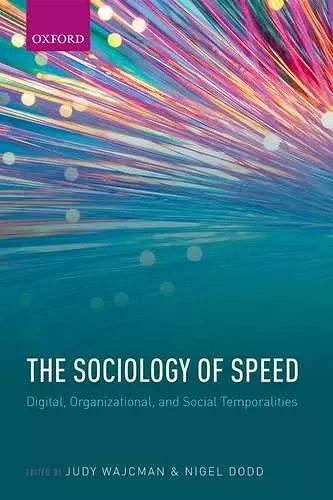The Sociology of Speed
Digital, Organizational, and Social Temporalities
Judy Wajcman editor Nigel Dodd editor
Format:Hardback
Publisher:Oxford University Press
Published:1st Dec '16
Currently unavailable, and unfortunately no date known when it will be back
This hardback is available in another edition too:
- Paperback£47.49(9780198782865)

There is a widespread perception that life is faster than it used to be. We hear constant laments that we live too fast, that time is scarce, and that the pace of everyday life is spiraling out of our control. The iconic image that abounds is that of the frenetic, technologically tethered, iPhone/iPad-addicted citizen. Yet weren't modern machines supposed to save, and thereby free up, time? The purpose of this book is to bring a much-needed sociological perspective to bear on speed: it examines how speed and acceleration came to signify the zeitgeist, and explores the political implications of this. Among the major questions addressed are: when did acceleration become the primary rationale for technological innovation and the key measure of social progress? Is acceleration occurring across all sectors of society and all aspects of life, or are some groups able to mobilise speed as a resource while others are marginalised and excluded? Does the growing centrality of technological mediations (of both information and communication) produce slower as well as faster times, waiting as well as 'busyness', stasis as well as mobility? To what extent is the contemporary imperative of speed as much a cultural artefact as a material one? To make sense of everyday life in the twenty-first century, we must begin by interrogating the social dynamics of speed. This book shows how time is a collective accomplishment, and that temporality is experienced very differently by diverse groups of people, especially between the affluent and those who service them.
Together with Judy Wajcman's recent oeuvre and preoccupation with the temporal, the evolving debate offers new sensitivities, conceptual connections that illuminate and explain the continuously reshuffling nature of the science, technology, and society relationship. * Filip Vostal, Centre for Science, Technology, and Society, Czech Academy of Sciences *
Speed marks the salient social and material transformations of the digital era, and yet speed has largely resisted theorizing. In this elegantly framed and intelligently curated collection, eminent sociologists Judy Wajcman and Nigel Dodd bring together some of the finest social theorists currently writing on technology, time and organization. This is an essential addition to our understanding of the accelerations, disruptions and crises that define the contemporary experience. * Sheila Jasanoff, Pforzheimer Professor of Science and Technology Studies, Harvard University (OR Harvard Kennedy School) *
Few feelings are more widespread than the sense that life has speeded up, from the pace of innovation to the schedule of our days. Judy Wajcman and Nigel Dodd weigh the evidence but also insightfully analyze the organizational and technological factors that drive the experience of speed. * Craig Calhoun, President, Berggruen Institute *
The acceleration of time is a leading characteristic of modernity. This excellent book contributes to our understanding of the many dimensions of temporal change by investigating the technological, power-infused and cultural underpinnings of speed. * Jens Beckert, Managing Director, Max Planck Institute for the Study of Societies *
ISBN: 9780198782858
Dimensions: 235mm x 164mm x 19mm
Weight: 464g
224 pages